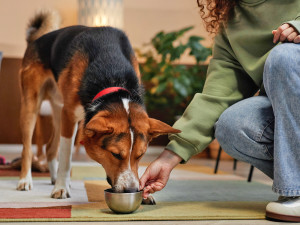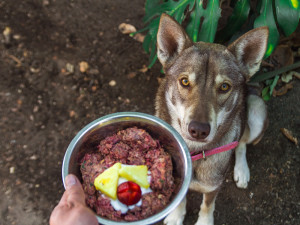Is a Grain-Free Diet Good For Dogs? Find Out the Scoop
We detail everything you need to know.
In This Article:
Understanding Grain-Free Diets For Dogs Are There Any Health Benefits of Grain-Free Foods For Dogs? Are There Drawbacks to Grain-Free Diets For Dogs? Comparing Grain-Free vs. Grain Dog Foods Bottom Line
Dog nutrition is a hot topic for dog parents. They want to feed the best option to keep their pup as healthy and happy for as long as possible, which comes with a lot of questions. Is organic or natural food better? Do you feed kibble, fresh, or raw diets?
And then, of course, there’s the grain free conundrum. Is grain-free the best food for dogs? The truth is that grain-free diets aren’t necessary for the vast majority of dogs as grains provide many essential nutrients.
Understanding grain-free diets for dogs
Though the name may seem fairly self-explanatory, let’s dive into what a grain-free diet is and why it may or may not be the best choice for your dog.
How much do you spend on your pet per year?
What are grain-free dog foods?
Dog food that is considered grain-free doesn’t include any grain. That means no wheat, corn, barley, oats, rice, rye, or any of their byproducts. These are typically added to dog foods as sources of carbohydrates, protein, and fiber, so grain-free dog foods have to use other ingredients, such as potatoes, sweet potatoes, lentils, and peas to replace them.
Nutritional aspects
The big reason that dog parents switch their dogs to a grain-free diet is the belief that it is more nutritious and healthier than those that contain grains. This is such a broad statement that it can’t be evaluated except on an individual basis. This means that some grain-free diets may be healthier when compared to some diets that contain grain and vice versa; it comes down to what exactly you’re comparing.
Overall, grain-free diets aren’t necessarily healthier as grains provide many benefits to a dog’s diet, including being a carbohydrate, protein, and fiber source. However, either diet can be very nutritious if it is complete and balanced and contains whole food ingredients.
Popularity and marketing of grain-free dog foods
So, if grain-free dog foods aren’t necessarily healthier than the alternatives, how did they get so much hype? It all boils down to marketing. With more and more people learning about gluten intolerance and other issues with the digestion of grains in humans, they tend to translate this to their dog’s health as well. But the fact of the matter is dogs are omnivores. They require both meat and plant sources in their diet and are typically able to digest grains without issue.
With all of the dog food brands out there, it can be hard to stand out, so some brands have taken to producing grain-free diets as something they feel is new and different and sure to trigger some dog parents’ sensitivities. If you ask most veterinarians, a grain-free diet is more of a marketing strategy than a healthier alternative for most dogs.
Are there any health benefits of grain-free foods for dogs?
Dogs are individuals, so you can’t look at the dog population as a whole and say that one thing will work for all of them, especially when it comes to food. So, yes, a grain-free diet may be the best choice for some dogs, mainly those who have an allergy to grains that potentially lead to itchiness, chronic ear infections, and other skin issues.
However, while food allergies are not uncommon in dogs, most are allergies related to the protein source in the food, including beef, chicken, and eggs. Dogs are much less commonly allergic to grains, such as wheat or corn.
Are there drawbacks to grain-free diets for dogs?
As long as grain-free dog food includes other ingredients to provide dogs with carbohydrates, protein, and fiber, and are complete and balanced, they can be very nutritious. But not all grain-free diets are.
Grain-free and heart disease
Starting around 2018, there was a vast increase in the number of dilated cardiomyopathy (DCM)opens in new tab seen in dogs. There are many factors that lead to this disease, but it is more commonly seen in a select number of dog breeds. The increase in DCM cases included breeds that weren’t routinely affected with a commonality being the diet they ate. This led to the hypothesis that grain-free diets lead to DCM. As Kinship reported in 2022, grain-free diets aren’t more nutritious for your dog.
“There has been no significant association with DCM and a specific protein source. But in 91 percent of the cases, the affected dogs were on grain-free diets, veterinarian Dr. Lindsay Wendt told us in our 2022 article. “In 89 percent of the cases, the diets included peas, and in 62 percent, they included lentils.”
While the jury’s still out with much more research to be done, it has been shown that diets low in the amino acid taurine are more likely to cause DCM in dogs. This doesn’t directly translate to grain-free diets, but these diets can be a problem if they aren’t complete and balanced, so it’s best to avoid them if you can. “Based on the strong connection between peas, in particular, and DCM, I would say there’s no benefit at this time to feeding your dog a diet with peas as a main ingredient source,” Dr. Wendt added.
Misconceptions about grain allergies in dogs
Allergies to grains are fairly rare in dogs, but there are still some dogs out there who can have issues. Grain allergies aside, there is also a noted gluten-sensitive enteropathyopens in new tab, seen mostly in Irish Setters, that can lead to chronic diarrhea and weight loss when these dogs consume foods containing grains.
Comparing grain-free vs. grain dog foods
So, which type of food is better? The truth is, the choice comes down to you and your veterinarian. Most dogs will do well on dog food that contains grains, while a select few will need a grain-free diet to avoid allergy symptoms such as itching or weight loss. The most important thing is to find a food that uses high-quality ingredients and is complete and balanced.
Pros and cons of each type of food
Dog food that contains grains is typically easier to find and provides essential nutrients. The majority of dogs can eat grains with no issues.
Grain-free dog food may be more expensive and not provide complete nutrition. However, it may be the best choice for dogs with grain allergies or sensitivities.
Bottom line
Grain-free dog foods have gained in popularity, mainly due to marketing campaigns rather than genuine claims of being healthier.
Most dogs can eat grains with no issues, but there are a few with grain allergies or sensitivities who may do better on a grain-free diet.
Speak to your veterinarian about whether your dog needs a grain-free diet.
References
“Canine Dilated Cardiomyopathy (DCM).” Cornell College of Veterinary Medicine. https://www.vet.cornell.edu/hospitals/services/cardiology/canine-dilated-cardiomyopathy-dcmopens in new tab.
“Gluten-sensitive enteropathy of the Irish Setter and similarities with human celiac disease.” Minerva Gastroenterologica e Dietologica. 9 Dec 2019. https://pubmed.ncbi.nlm.nih.gov/31820885/opens in new tab.
Pucheu-Haston, Cherie M, DVM “Cutaneous Food Allergies in Animals.” Merck Veterinary Manual. Sep 2024. https://www.merckvetmanual.com/integumentary-system/food-allergy/cutaneous-food-allergy-in-animalsopens in new tab.











